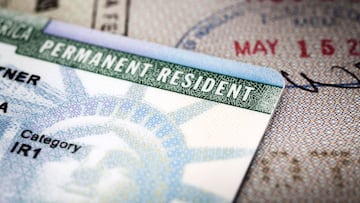Which immigrants can travel to the US while waiting for a Green Card?
The US Department of Homeland Security has a program that allows immigrants to travel to the country while they are still waiting for their Green Card.

Millions of immigrants cross the border of the United States in pursuit of the so-called ‘American dream’. Starting from scratch in a new country is a difficult task, but certain people who have family who are already US residents may have a key factor in their favor, thanks to the Family Reunification Program or FRP of the Department of Homeland Security.
The US government has already helped nearly 3,000 migrants under the program. Through this, a temporary stay permit in the United States is granted to certain migrants awaiting approval of their Green Card.
READ ALSO: What happens if you don’t file taxes?
Which immigrants can travel to the USA while waiting for a Green Card?
According to the DHS website, the FRP is aimed at immigrants originating from Colombia, Cuba, Ecuador, El Salvador, Guatemala, Haiti and Honduras. Reunification processes are only available by invitation. Additionally, petitioners - who are the US resident family members of immigrants - must submit the application to DHS on behalf of those seeking to be beneficiaries.
Family members who receive an invitation and are interested in starting the process on behalf of a future beneficiary, must submit Form I-130 to DHS. Through this, the eligibility of the petitioner and the beneficiary will be determined. Once you are notified of your eligibility, you may file Form I-134A to apply to become support persons for a beneficiary and begin the FRP process.
The United States Citizenship and Immigration Services will then determine whether or not to grant advance travel authorization to the beneficiary, who can wait in US territory until their immigrant visa becomes available. Subsequently, you may adjust your status to that of a legal permanent resident, provided you are eligible.
READ ALSO: The difference between tax credits and tax deductions
Eligibility Requirements
Petitioners may file Form I-134A if they meet the following requirements:
- They are US citizens or legal permanent residents of the United States
- They submitted Form I-130 and USCIS approved it
- They received a written invitation to file a Form I-134A in the name of the primary beneficiary of the approved Form I-130
Here are the eligibility requirements for the beneficiary:
- Being outside the United States
- Have a valid passport for international travel
- Be the primary beneficiary of a Form I-130
- Be a citizen of one of the countries eligible for the family reunification process
- Have a petitioning relative in the United States
- Not having been issued an immigrant visa when the FRP invitation is issued





